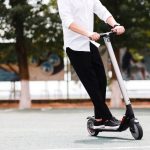(HealthDay News) — Wet leaves, fog, sun glare, frost and wildlife are some of the driving hazards that motorists encounter each Autumn, says the Pennsylvania Department of Transportation. To stay safe while driving at this time of year, PennDot encourages you to: Slow down and use caution, especially where there are deer crossing signs. Be most careful during morning and evening, when wildlife is most active. Increase your following distance in severe weather. Check that your headlights, taillights, treads and wiper systems are working properly. Always wear your seatbelt. Never drive impaired.
All Travel:
Health Tip: Ridesharing Safety
(HealthDay News) — Ridesharing services such as Uber and Lyft have become very popular in recent years. Though most companies conduct background checks on prospective drivers, you should still take precautions when using these services, says LIM College. When ridesharing, the school urges you to: Check the driver’s rating. Avoid riding in the front seat. Always wear your seatbelt. Follow along with your own GPS or the app. Travel in groups. Allow family and friends to track your location. Trust your instincts.
More Teens Learning to Drive in Safer Conditions

Could America’s roads become safer in the future? Maybe. A new online survey involving just over 1,400 participants showed that a growing number of American teens are getting their driver’s license before age 18, which means more of them are learning to drive under supervised conditions. The AAA Foundation for Traffic Safety study released Oct. 21 surveyed teens and young adults aged 18 to 24 to determine when they got their license. The questionnaire was administered over this past summer. The researchers found that nearly 41% of survey participants got their license at or before age 16, and about 60% did so before age 18, an 11% increase since 2012. “The trend for teens to acquire their driver’s license has changed over the past 10 years,” said David Yang, executive director of the AAA Foundation for Traffic Safety. “Many are getting licensed before the age of 18, which means more of Generation Z is learning to drive under the protection of state graduated-driver licensing programs and parental supervision,” Yang added in a foundation news release. In 2012, the United States was just emerging from a recession and many young people said they’d delayed getting their license because their family couldn’t afford the high cost of having an additional driver, the researchers noted. The new study also found that nearly two-thirds of respondents in less urbanized… read on >
Health Tip: Practicing Motorcycle Safety
(HealthDay News) — More than 5,000 motorcyclists were killed in crashes in 2017 alone, says the U.S. National Highway Traffic Safety Administration. To stay safer on the road, the agency encourages motorcyclists to: Practice operating your motorcycle before taking it into traffic. Check your motorcycle’s tire pressure, tread depth, breaks, lights and fluid levels before riding. Wear a helmet that meets federal safety standards and proper body protection. Obey traffic lights, signs, speed limits and lane markings. Stay alcohol- and drug -ree.
Health Tip: Pregnancy and Amusement Park Rides
(HealthDay News) — Pregnant women should not ride roller coasters or other jarring rides at the amusement park, says the American Pregnancy Association. The rapid starts and stops and jerky motions that characterize these rides can lead to premature separation of the placenta, the group says. Premature separation has occurred among many women in car accidents. Currently, there are no studies documenting the safety of thrill rides for pregnant women. But the American Pregnancy Association suggests playing it safe, recommending that pregnant women avoid such rides altogether.
Health Tip: Helping Children Adjust to a Move
(HealthDay News) — Job loss, promotion, a transfer and other life changes can force families to move. For children, a move can be stressful and accentuate negative aspects of their personalities, says the American Academy of Pediatrics. To help a child adjust to a move, the academy encourages parents to: Emphasize the positive aspects of what awaits at the new location. Let your child express his or her feelings and acknowledge sadness. Take your child to the community where you will be moving. Give the child the chance to participate in decisions, such as the new room color. Become involved in the new community yourself. Maintain contact with the old community.
Health Tip: Avoiding Cholera
(HealthDay News) — Cholera causes 95,000 deaths around the world each year, says the U.S. Centers for Disease Control and Prevention. All travelers and residents in areas where cholera is occurring should take precautions to protect themselves and family members. To avoid contracting cholera, the CDC recommends: Drink and use safe water. Wash your hands often with soap and safe water. Use latrines or bury your feces. Never defecate in a body of water. Cook food well, keep it covered and eat it hot. Peel fruits and vegetables. Clean the kitchen and areas where the family bathes or washes clothes.
E-Scooters Plus Drinking: A Fast-Pass to the ER?

Drinking and driving an electric scooter doesn’t mix, according to a new study. Researchers reported serious injuries like brain bleeding or fractures that have happened while riding an electric scooter (e-scooter). Alcohol and drugs were a factor in many of these crashes. “E-scooters may look like fun and games, but it’s a vehicle. It’s a motor attached to wheels, and you need to have a healthy respect for it. Anyone drinking or using any mind-altering substance should not be operating an e-scooter,” said the study’s lead author Dr. Leslie Kobayashi. She’s an associate professor of clinical surgery at the University of California, San Diego. Several people have died while riding e-scooters, according to published reports. Though these devices aren’t new, their popularity soared when several companies introduced rentable, dockless e-scooters in 2017, according to the study authors. Less than a year after the introduction of this environmentally friendly mode of transportation, almost 4% of U.S. adults said they had ridden one. E-scooters are available in more than 65 cities, the study said. The laws regulating them vary depending on where you’re riding. In California, drivers over age 18 aren’t required to wear helmets, and they can use e-scooters on roads with speed limits up to 35 mph. Kobayashi’s study found that almost none of the injured riders was wearing a helmet. She said anytime you’re… read on >
Health Tip: Parking Lot Safety
(HealthDay News) — Thousands of vehicle crashes occur in parking lots and garages annually, says the National Safety Council. Around the holidays in particular, parking lots become even more dangerous. To stay safer in a parking lot, the council recommends: Stay in your lane. Avoid cutting across the lot. Drive slowly and use directional signals. Anticipate the actions of other drivers. Obey stop signs and no-parking signs. Be mindful of others when backing out. Watch for small children and baby strollers.
Unplugging From Social Media on Vacation? It’s Tough at First

Taking a vacation from social media and digital technology while you travel can cause withdrawal symptoms, but a small study suggests you’ll come to enjoy the offline experience. The British study included 24 people. During their travels to 17 countries and regions, most unplugged from technologies such as mobile phones, laptops, tablets, social media and navigation tools for more than 24 hours. Their reactions before, during and after their “digital detox” were gathered through diaries and interviews. Many had initial anxiety, frustration and withdrawal symptoms, but then increased levels of acceptance, enjoyment and even liberation, according to the study published Aug. 14 in the Journal of Travel Research. “Many people are increasingly getting tired of constant connections through technologies and there is a growing trend for digital-free tourism, so it is helpful to see the emotional journey that these travelers are experiencing,” said lead author Wenjie Cai, a lecturer at the University of Greenwich in London. Researchers said there is growing demand for digital detox holidays. “Our participants reported that they not only engaged more with other travelers and locals during their disconnected travels, but that they also spent more time with their travel companions,” Cai said in a journal news release. The findings could be important for travel companies seeking to develop off-the-grid vacation packages, according to study co-author Brad McKenna, a lecturer at… read on >















-300x200.jpg)













